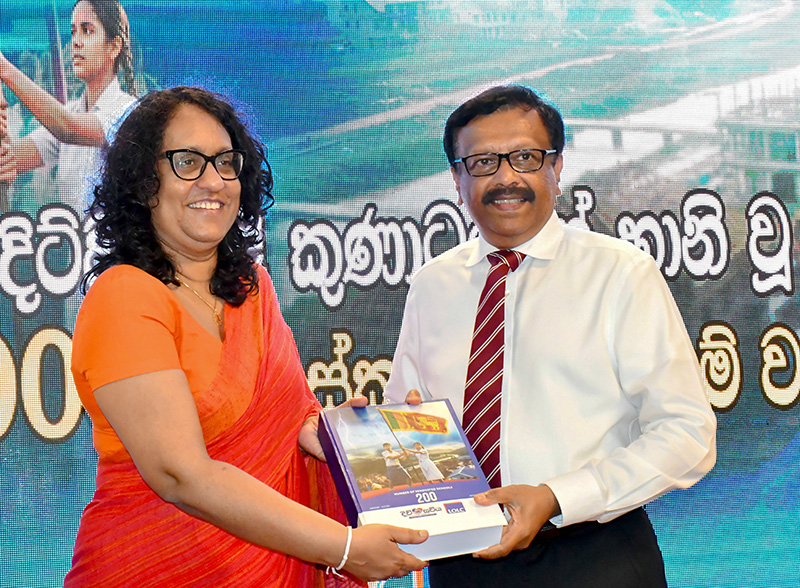Business
Women’s increasing vulnerability and COVID-19

Sri Lanka’s Gender-based Employment Segregation
By Sunimalee Madurawala
Although COVID-19 may be gender-blind, it has created a crisis that has disproportionately affected women across the globe. The economic impact of the pandemic is mostly channelled through the labour market. Estimates show that women’s jobs are 1.8 times more vulnerable than men’s jobs, and while women make up 39% of global employment, they account for 54% of overall job losses. While many factors affect the vulnerability of women’s employment during the pandemic, existing gender gaps in the labour market, women’s employment share in highly-affected sectors, the ability to telecommute and the amount of unpaid care work carried out by women have been identified as the main determinants. In this context, this blog examines women’s vulnerability in the Sri Lankan labour market due to the sector they are employed in. It also looks at gender-based employment segregation – a key factor behind women’s overrepresentation in certain industries and underrepresentation in others – and proposes policy measures to address this imbalance.
Impact of COVID-19 on Employed Women in Sri Lanka
A comparison of labour market figures and indicators for Sri Lanka for the fourth quarters of 2019 and 2020 shows a severe impact on women (Figure 1). While the absolute number of employed men has increased by 38,938, the number of employed females has decreased by 189,148. The number of economically inactive persons has increased between the years. Females account for 64% of that increase in economically inactive persons. The labour force participation (LFP) rates for both sexes have decreased significantly but the fall is more prominent for women. The unemployment rate has increased for both sexes during the period, whereas the increase for men is marginally higher than that for females attesting to the lowered LFP of women.
The Sector Matters
The greater impact on employed women due to the pandemic is linked directly with the sectors they are employed in. Calculations of the author on women’s employment in Sri Lanka based on an assessment by the International Labour Organization indicate that their employment share is high in both low-risk and high-risk economic sectors (Figure 2).
Manufacturing (including the sub-sector of textile manufacturing), accommodation and food services, and wholesale and retail are high-risk sectors with relatively high female employment shares. Female representation is relatively high in some medium-high risk and medium risks sectors such as ‘arts, entertainment, recreation, and other services’ and ‘financial and insurance activities’, respectively, as well. Even though health is a low-risk sector, women employed in the health sector face a higher risk of contagion.
Gender-based Employment Segregation – a Cause for Women’s Employment Vulnerability?
Gender-based employment segregation – ‘the unequal distribution of men and women across and within job types’, is often the major reason for women’s (or men’s) over-representation in certain sectors. In most cases, especially for females, their choice of employment is linked with the traditional gender roles they play in society (i.e. direct and indirect care responsibilities such as caring for children, the elderly, and the sick, cleaning, cooking, shopping, and fetching water and fuel). For example, in Sri Lanka, the female share in several frontline occupations is high (i.e., health professionals, health-related professionals, and care workers). These occupations are directly linked with women’s traditional gender roles.
Gender-based employment segregation creates unfavourable labour market conditions such as gender gaps in wages, job quality and employment trajectories. Demand-side factors, as well as supply-side factors, limit women’s choice in selecting an employment sector, thus causing employment segregation. Gender gaps in skills and qualifications, domestic and care responsibilities, safety (i.e. harassment at workplaces and when using public transport) issues, and lack of role models and networks are some important supply-side factors. Gender biases in recruitment, evaluation and promotion processes, employers’ perceptions of women employees (where employers perceive women employees as more suitable for certain types of jobs) and features of the workplace culture are important demand-side factors.
Way Forward
 Both training in hard skills and soft skills would increase women’s chances of securing employment in fields traditionally dominated by males. Specific interventions that reduce and redistribute women’s domestic and care responsibilities (i.e. expanding access to key infrastructure for care and investing in labour-saving technology, and redistributing care responsibilities between men and women within households and between households and state and other institutions) would lessen the burden of care responsibilities borne by women. This would create an enabling environment for women to participate in labour market activities and to expand the array of employment options available for them.
Both training in hard skills and soft skills would increase women’s chances of securing employment in fields traditionally dominated by males. Specific interventions that reduce and redistribute women’s domestic and care responsibilities (i.e. expanding access to key infrastructure for care and investing in labour-saving technology, and redistributing care responsibilities between men and women within households and between households and state and other institutions) would lessen the burden of care responsibilities borne by women. This would create an enabling environment for women to participate in labour market activities and to expand the array of employment options available for them.
Strengthening the legal framework and law enforcement mechanisms is important to ensure the safety of working women both at the workplace and when travelling to work. Furthermore, promoting female role models who have succeeded in traditionally male-dominated sectors would inspire women to choose such careers. In addition, establishing workplace cultures that practice gender-blind recruitment, evaluation, and promotion processes are needed to curtail demand-side factors of gender-based employment segregation.
* This blog is based on the comprehensive chapter on “The COVID-19 Pandemic and Employed Women: Ensuring Gender Equality beyond the Pandemic” in IPS’ forthcoming annual flagship publication ‘Sri Lanka: The State of Economy 2021’.
Link to blog: https://www.ips.lk/talkingeconomics/2021/09/07/sri-lankas-gender-based-employment-segregation-does-it-increase-womens-vulnerability-amidst-covid-19/
Sunimalee Madurawala is a Research Economist at IPS. Her research interests include health economics, gender and population studies. Sunimalee holds a BA (Economics Special) with First Class Honours and a Masters in Economics (MEcon) from the University of Colombo, Sri Lanka. (Talk to Sunimalee – sunimalee@ips.lk)
Business
Iran strikes could add external pressure on Sri Lanka’s fragile recovery: Analyst

The U.S. and Israeli strikes on Iran have reignited geopolitical tensions in the Middle East, stoking fears of a broader conflict that could disrupt critical energy supply routes – particularly the Strait of Hormuz, through which roughly one-fifth of the world’s oil supply flows. Brent crude has already edged higher, and global oil markets warn prices could climb toward, or even exceed, US$80–100 a barrel if hostilities escalate.
Against this backdrop, an independent economic analyst told The Island that for Sri Lanka – a small, fuel-importing economy with limited domestic energy resources – the implications could be significant.
“Sri Lanka imports over 90% of its petroleum requirements, and any sustained rise in global crude prices would expand the annual import bill, placing renewed pressure on already tight foreign exchange reserves,” he said.
Even moderate spikes in oil prices, he noted, tend to filter quickly through the domestic economy. “Higher fuel costs translate into increased transport and production expenses, which feed into inflation and erode household purchasing power. Freight charges for essential goods – from food items to industrial inputs – would also rise.”
“The Middle East remains a key source of remittances and export demand,” the analyst explained. “A large share of Sri Lankan migrant workers are employed in Gulf economies, while regional markets absorb tea and other exports. Heightened instability could weaken remittance inflows and soften demand, further straining the balance of payments.”
When asked whether the Central Bank of Sri Lanka (CBSL) might be compelled to shift policy in response, the analyst said the monetary authority faces a delicate balancing act.
“Rising import inflation stemming from higher global energy prices could push the Central Bank to maintain – or even tighten – its monetary policy stance in order to safeguard price stability and support the rupee. A firmer stance may be deemed necessary to anchor inflation expectations and preserve market confidence. The Central Bank is therefore likely to monitor inflation data closely in the coming weeks to assess whether energy-driven price pressures prove temporary or more entrenched,” he said.
Meanwhile, Ceylon Petroleum Corporation (CPC) Chairman S. Rajakaruna said that Sri Lanka’s fuel imports – sourced primarily from Singapore and India – reduce immediate exposure to supply disruptions directly linked to Middle Eastern routes. He also sought to allay public concerns, noting that the country currently maintains sufficient fuel stocks for approximately one month and that there need not be any queueing up by the public to hoard supplies.
However, the analyst cautioned that while physical supply may remain stable, global price pass-through effects are an unavoidable risk.
Meanwhile, Opposition politician Wimal Weerawansa said that official assurances of “one month’s stock” tend to unsettle the public, arguing that such statements evoke memories of past shortages and public distress.
By Sanath Nanayakkare
Business
Ministry of Education recognises LOLC Divi Saviya for restoring 200 schools

The Ministry of Education officially recognised LOLC Holdings PLC for its flagship humanitarian initiative, Divi Saviya, at a special ceremony held on 27th February 2026 in Battaramulla. The event marked the second time the Ministry has acknowledged the programme’s contribution to the nation’s education sector.
Group Managing Director/CEO Kapila Jayawardena presented a project update to Prime Minister and Education Minister Dr. Harini Amarasuriya, highlighting the rapid restoration of 200 schools under Phase 02 of ‘Obai, Mamai, Ape Ratai’. The schools were repaired and handed over within just 45 days, enabling students displaced by Cyclone Ditwah to safely resume learning.
Phase 02 follows a needs assessment that identified 200 damaged schools and 4,000 displaced families. Implemented with Divisional Secretariats and Disaster Management Centres, the Rs. 500 million programme has delivered Family Super Packs and school renovations across six districts.
Kapila Jayawardena stated, “It was a privilege to share these outcomes with the Prime Minister. This recognition reflects how private sector collaboration can complement government efforts during national challenges.” Plans are underway to fully rebuild select schools destroyed by the cyclone.
Business
Nestlé Golden Chef’s Hat Competition 2026 to nurture Sri Lanka’s culinary talent

Nestlé Professional, the B2B arm of Nestlé Lanka, signed a Memorandum of Understanding (MoU) with the Chefs Guild of Lanka and the Sri Lanka Hospitality Graduates Association to collaborate in organizing the Nestlé Golden Chef’s Hat and Nestle Golden Chef’s Hat Junior Competition 2026. This islandwide culinary competition aims to identify, nurture, and develop emerging culinary talent within Sri Lanka’s hospitality industry, reinforcing Nestlé Professional’s commitment to supporting the growth of the hospitality sector and the next generation of chefs.
The Chefs Guild of Lanka will support the Professional category of the Nestlé Golden Chef’s Hat Competition 2026, facilitating eight regional competitions across the island. These regional rounds will provide a competitive platform for professional chefs to showcase their culinary expertise while helping them to develop their culinary skills further.
In parallel, Nestlé Professional Sri Lanka, in collaboration with the Sri Lanka Hospitality Graduates Association and Chefs Guild of Lanka, will organize the Junior Nestlé Golden Chef’s Hat Competition 2026, aimed at nurturing students within Sri Lanka’s hospitality sector. The regional rounds of the junior competition will be conducted across prominent hotel schools island‑wide, creating a structured platform to identify, mentor, and inspire the young students who aspire of becoming the top chefs in the country and world-wide.
Bernie Stefan, Chairman and Managing Director of Nestlé Lanka commented, “For 120 years, Nestlé has been enriching Sri Lankan lives by unlocking the power of food and beverages to enhance quality of life. This commitment has also been demonstrated in our endeavour to strengthen Sri Lanka’s foodservice ecosystem. The Nestlé Golden Chef’s Hat Competition 2026 and Junior Competition is a platform that brings together industry expertise, education, and opportunity – empowering both professional chefs and hospitality students to reach their full potential.
-

 News7 days ago
News7 days agoPrime Minister Attends the 40th Anniversary of the Sri Lanka Nippon Educational and Cultural Centre
-

 Opinion3 days ago
Opinion3 days agoJamming and re-setting the world: What is the role of Donald Trump?
-

 Sports7 days ago
Sports7 days agoDottin out obstructing the field as Sri Lanka clinch series
-

 Features3 days ago
Features3 days agoAn innocent bystander or a passive onlooker?
-

 Features5 days ago
Features5 days agoBuilding on Sand: The Indian market trap
-

 Opinion5 days ago
Opinion5 days agoFuture must be won
-

 Features4 days ago
Features4 days agoRatmalana Airport: The Truth, The Whole Truth, And Nothing But The Truth
-

 Business4 days ago
Business4 days agoIRCSL transforms Sri Lanka’s insurance industry with first-ever Centralized Insurance Data Repository













